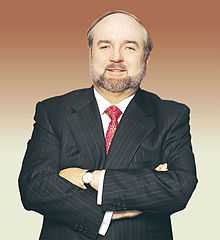Carlos Pellas Chamorro
Carlos Pellas was born on January 10, 1953 in Granada, Nicaragua. He has an Italian background, his family came to Granada from the north of Italy.

Chairman of the Board
Mr. Pellas is Chairman and major shareholder of Grupo Pellas, a corporate identity with more than 25 companies and presence in the United States, the Caribbean, Central America and Panama, positioned in different sectors: financial, agroenergy, tourism, technology, automotive marketing, production and sale of liquor, health, telecommunications, entertainment, real estate, insurance and related activities under the regime of free trade zones. Grupo Pellas generates thousands of direct and indirect employments in the countries where it operates.
Mr. Pellas is Chairman of the Board of the following companies: BAC Florida Bank; The SER Holding, owner of four refineries, two distilleries, including Companía Licorera de Nicaragua (maker of Flor de Caña[1][2] and other rums, with sales of more than 3 million cases worldwide), and a biofuel plant in Central America; GBM Corporation, an IBM alliance company with exclusive distribution rights in Central America; and Pellas Development Group with real estate investments of over $300M in the region.[3][4][5] Mr. Pellas is also director and partner of Casa Pellas, which distributes Toyota, Hino, Suzuki, and Yamaha in Nicaragua, and of FRUTAN, one of the six largest orange plantations in the world.
He founded BAC Credomatic Network in 1985, and sold it in 2010 in what is recognized as the largest financial transaction ever in Central America.
Philanthropy
Mr. Pellas is involved in many philanthropic and non-profit initiatives. He is a member of the Board of Trustees of the following institutions:
INCAE Business School (as one of the top Business School in Latin America, INCAE has graduated more than 5000 MBA’s in its 40 year history); American Nicaraguan Foundation (ANF has channeled more than a billion dollars to Nicaragua in the last 20 years to contribute substantially and sustainably to reduce the impact of poverty in the lives of the most vulnerable population in Nicaragua); Asociación Pro Niños Quemados de Nicaragua (APROQUEN which is headed by his wife, Vivian Pellas, has provided more than 30,000 surgeries, free of charge, to improve the lives of burned children in Nicaragua); International Game Fish Association (IGFA, a non for profit organization dedicated to the protection of game fish throughout the world), and Centro Empresarial Pellas.
Awards and recognitions
Mr. Pellas has been the recipient of many awards. The Chambers of Commerce of Latin America in USA named him Businessman of the Year in 2005; top executives and entrepreneurs from Central America have chosen him in the last five years as one of the most admired businessmen in the región; he was distinguished in April 2008 by the President of Italy with the Order of the Stella Della Solidarietá Italiana in Grande Ufficiale.[6][7][8][9] In October 2008 he was named Honorary Consul of Italy in Granada, Nicaragua.[10] The American Nicaraguan Chamber of Commerce – AMCHAM - awarded him the Business Excellence Award in 2012.
He served as a director of the Nicaraguan Chamber of Industries for more than 20 years, Visa International-Latin America and IBM Latin America for more than 5 years. In 2012 he was elected Vice President of the Board of Directors of INCAE, an appointment made for the first time in the history of this institution.
Critic against Grupo Pellas
Grupo Pellas has received a lot of critic for the work conditions in their sugarcane plantations. In a recent article the Guardian reported about a high number of chronic kidney disease (CKD) among sugarcane workers who had worked at Ingenio San Antonio (ISA), Nicaragua’s oldest and largest sugar mill, owned by Grupo Pellas. There is a growing scientific view that CKD is linked to harsh work conditions, particularly long hours exposed to sun without sufficient shade, rest and water. Dr Catharina Wesseling, an epidemiologist based at the Karolinska Institute in Sweden said that while other factors - such as pesticides, heavy metals and genetics – could also play a part, there was “absolutely no doubt” that CKD was an occupational disease.[11]
Background
Carlos Pellas holds a B.A. in Economics, an M.A. in Food Research and an MBA, all from Stanford University. Mr. Pellas and his wife Vivian reside in Managua, Nicaragua. They are the parents of three children.
References
- ↑ Flor de Cana Website
- ↑ Tour Flor de Cana
- ↑ Santa María Golf & Country Club
- ↑ Guacalito de la Isla
- ↑ Mukul Beach, Golf and Spa
- ↑ ITALIA CONDECORA A CARLOS PELLAS
- ↑ CARLOS PELLAS LLAMA A TRABAJAR UNIDOS
- ↑ GOBIERNO ITALIANO CONDECORA A CARLOS PELLAS CHAMORRO
- ↑ GOBIERNO ITALIANO CONDECORA A CARLOS PELLAS
- ↑ CARLOS PELLAS CONSUL HONORARIO EN GRANADA
- ↑ http://www.theguardian.com/world/2015/feb/16/-sp-nicaragua-kidney-disease-killing-sugar-cane-workers
External links
- Grupo Pellas's Website
- Grupo Pellas News Portal
- Follow us on Twitter
- Grupo Pellas on Youtube
- Nicaragua Sugar Estates Limited
- Rum Flor de Cana
- Compania Licorera de Nicaragua
- American Nicaragua Foundation - ANF
- Casa Pellas
- GBM
- Entrevista de la Revista Forbes a Carlos Pellas Chamorro
- Entrevista a Carlos Pellas Chamorro sobre la labor de la Asociacion Pro Ninos Quemados de Nicaragua - APROQUEN
- Entrevista de la revista Estrategia y Negocios a Carlos Pellas Chamorro en ocasión de haber sido sido elegido por 3a vez entre los empresarios más admirados de la región
- AMCHAM otorga premio a la "Excelencia Empresarial 2012" a don Carlos Pellas
- El liderazgo debe ser ético - Entrevista del Diario La Prensa de Nicaragua, en ocasión de haber sido elegido Empresario del Año por AMCHAM
- Crea, crece, construye - Entrevista de la revista Estrategia y Negocios a Carlos Pellas Chamorro en ocasión de haber sido sido elegido por 5ta vez entre los empresarios más admirados de la región
- Resort de clase mundial
- The Challenge of Pitching Nicaragua as the Next Paradise
- A Delicate Balance | Nicaragua
- Hottest new hotels for 2013